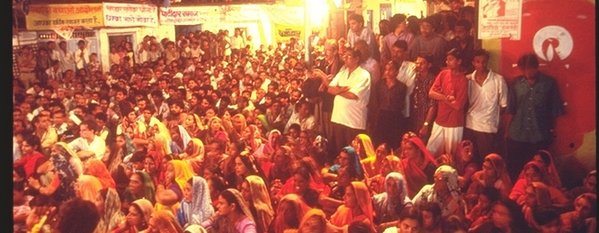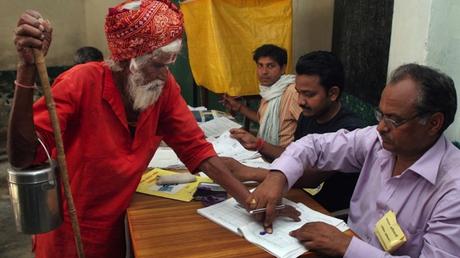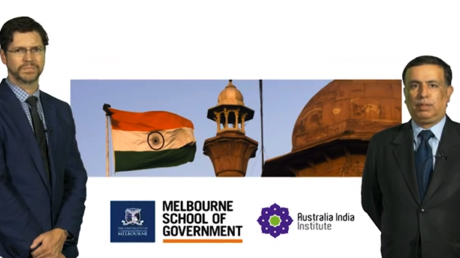
The great Indian festival of democracy has just begun…
General elections in the world’s largest democracy are always a reflection of the complexities of India and its stark contradictions. The 2014 parliamentary elections, announced on Wednesday, promise to be even more argumentative and confrontational than the 15 elections held in the past, as 815 million adult citizens decide who is going to govern India next, with polling in 28 states spread over nine phases from 7 April to 12 May.
The votes will be counted through Electronic Voting Machines on 16 May and a new government should be in place shortly thereafter. At the centre of the election is the contest between the ruling Congress Party-led United Progressive alliance and the National Democratic Alliance led by the Bharatiya Janata Party. While the contest is, at one level, about leadership, governance and policies, elections in the country are more fundamentally about the idea of modern India itself and its abiding faith in the ability of its citizens to make the right choice.
When in 1947, India - independent from British rule - opted to be a constitutional democracy, few gave it much of a chance. Democracies had thrived where there was a reasonable degree of homogeneity and where the basic needs of citizens had been met. In contrast, India’s diversity – linguistic, ethnic, religious and regional – was overwhelming and it was home to some of the world’s poorest. But except for a brief period between 1975 and 1977, Indian democracy has not just thrived but succeeded beyond the expectations of even the most optimistic.
Academics will continue to interrogate the wonder of Indian democracy, but for the next two months India, Indians, and the world outside can enjoy this riotous festival.
The puzzle of Indian democracy is even more fascinating because countries within the region (detached from the British empire at about the same time) and parts of Africa and Latin America which experimented with democracy have had a less fortunate tryst with the ballot box. What has been responsible for India’s success with the democratic political system? Was it the benefit of a wise leadership at birth that was committed to the democratic way? Was it India’s comprehensive constitution that created an elaborate system of checks and balances that would prevent India’s descent into authoritarianism? Was it the policies of affirmative action that would allow for social mobility and prevent a popular revolutionary zeal? Was it the steel frame of the conservative bureaucracy that ensured that institutional processes rather than individual whims would define the way India would be governed? Or was democracy, as the Nobel Laureate Amartya Sen would put it, part of a long-standing civilisational tradition of debate, dissent and even heterodoxy in India - almost part of the DNA of the “argumentative” Indian?
Academics will continue to interrogate the wonder of Indian democracy, but for the next two months India, Indians, and the world outside can enjoy this riotous festival. Louder, bigger and more colorful than the Mardi Gras, the Carnival and La Tomatina put together, the 16th Indian general election promises to overturn many stereotypes.
Will the traditional electoral arithmetic based on calculations of caste, religion, and language prevail? Or is there a new pan Indian sentiment for good governance and new opportunities that will be decisive? Will it be primarily a two-way contest between the BJP and the Congress (with smaller regional parties aligning with one or the other)? Or is there a chance of a Third Front? And what are the chances of the new Aam Admi Party (AAP: the common man’s party) which made a stunning recent debut in the state elections in the country’s capital? Will the 100 million young, impatient and assertive Indians make a difference? Or will the old order rule the roost again? Will an agenda for absolute economic growth take precedence over more inclusive growth – even while there is, in reality, no such Manichean choice?
But most attention will perhaps be paid, by the media, to the leadership: the feisty oratory of the BJP’s thrice-elected Gujarat chief minister, Narendra Modi who invites extreme passions; contrasted with the mild almost reclusive style of the Congress’s Rahul Gandhi, who even his admirers admit has not lived up to his potential; and the steely determination of the man against all odds: AAP’s Arvind Kejiriwal.
PS: I am writing this from my hotel room in Lutyen’s New Delhi in the early hours the morning: the imposing Parliament building just visible from my room. Each time the elections are announced, my latent nationalism comes to the fore and I am proud, as ever, to have been born in this country. We may not have solved the country’s problems, the stark poverty outside the hotel is just one reminder of the challenges that exist, but to give a billion people a voice, a chance, to decide their future and future of the country – everything else fades into insignificance.
This article first appeared on The Conversation.





